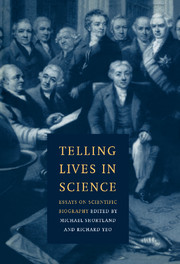Book contents
- Frontmatter
- Contents
- List of contributors
- Preface
- Introduction
- 1 Existential projects and existential choice in science: science biography as an edifying genre
- 2 Life-paths: autobiography, science and the French Revolution
- 3 From science to wisdom: Humphry Davy's life
- 4 Robert Boyle and the dilemma of biography in the age of the Scientific Revolution
- 5 Alphabetical lives: scientific biography in historical dictionaries and encyclopaedias
- 6 The scientist as hero: public images of Michael Faraday
- 7 ‘Tactful organising and executive power’: biographies of Florence Nightingale for girls
- 8 Taking histories, medical lives: Thomas Beddoes and biography
- 9 The scientist as patron and patriotic symbol: the changing reputation of Sir Joseph Banks
- 10 Metabiographical reflections on Charles Darwin
- Index
6 - The scientist as hero: public images of Michael Faraday
Published online by Cambridge University Press: 28 October 2009
- Frontmatter
- Contents
- List of contributors
- Preface
- Introduction
- 1 Existential projects and existential choice in science: science biography as an edifying genre
- 2 Life-paths: autobiography, science and the French Revolution
- 3 From science to wisdom: Humphry Davy's life
- 4 Robert Boyle and the dilemma of biography in the age of the Scientific Revolution
- 5 Alphabetical lives: scientific biography in historical dictionaries and encyclopaedias
- 6 The scientist as hero: public images of Michael Faraday
- 7 ‘Tactful organising and executive power’: biographies of Florence Nightingale for girls
- 8 Taking histories, medical lives: Thomas Beddoes and biography
- 9 The scientist as patron and patriotic symbol: the changing reputation of Sir Joseph Banks
- 10 Metabiographical reflections on Charles Darwin
- Index
Summary
Like many readers of this chapter my early encounters with science were not only through the school laboratory and classroom but also through reading biographies of scientists. Excepting the adventures of Biggies and Gimlet, my serious reading as a child was largely confined to biographies of Newton, Davy, Pasteur and many others, often in the form of collected biographies, such as Egon Larsen's Men who Changed the World (1954) and J.G. Crowther's Six Great Scientists (1955). Such works kindled my interest in science and played some role (which I leave to my future biographers to specify) in my choice of career, first as a physicist and subsequently as an historian of science. Yet as a young consumer of biographies I would have had no appreciation of the complexities of biographical narratives or of their cultural, educational and ideological functions. I simply lapped them up and contented myself by reading about the Great and the Good and how they contributed to science.
More recently I have re-engaged the subject of scientific biography not only as a consumer but also as a producer, in writing a biographical study of Michael Faraday, in which I paid particular attention to the interrelation between his science and his religion.
- Type
- Chapter
- Information
- Telling Lives in ScienceEssays on Scientific Biography, pp. 171 - 194Publisher: Cambridge University PressPrint publication year: 1996
- 10
- Cited by



